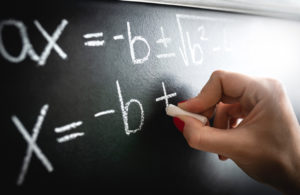
Math equation on a chalkboard
July 28, 2021
Six Highlands graduate students have earned a degree from a new pilot program designed to help improve math education in New Mexico.
The cohort will receive their diplomas in Educational Leadership with a math teacher leader concentration in a small ceremony scheduled for August 4.
Highlands already offered a master’s degree in Educational Leadership but worked in partnership with Los Alamos National Laboratory to develop a pilot program for the 2020-21 academic year that offers a math teacher leader concentration.
New Mexico currently ranks 49th in the United States in math on standardized test performances.
“The state has recognized that we need to do more in math education,” said Robert Karaba, assistant professor of the Educational Leadership program at Highlands University. “There are teacher shortages all over, and I think math teacher shortages are even more prominent.”
Once they complete a file of teaching documents, math teacher leaders will be eligible for a $10,000 pay raise within their districts, and according to Karaba, the skills they have learned in the pilot program will support their trajectory in becoming leaders in the schools where they already work.
“They will become instructional coaches within their district, or they’ll become informal leaders, whether they’re department heads in their middle schools or elementary schools,” said Karaba.
The pilot program in math teacher leadership developed out of an existing partnership between Highlands and LANL. Two ongoing programs, the Math Teacher Leader Network and the Regional Partnership School, provide professional development and networking opportunities to math teachers in K-8 schools in Pojoaque, Los Alamos, Santa Fe, Cuba, Bloomfield, Taos, Jemez, and Española.
Zach Leonard, an education specialist with the Math and Science Academy at the Lab, said the pilot program builds on existing resources and provides an opportunity for math teachers to earn a master’s degree if they haven’t yet earned one.
“So many master’s programs are wonderful, but they focus largely on the development of your own teaching and learning and within the classroom,” said Leonard. “And that’s great, but at the same time, we wanted to catalyze change at the system’s level by combining mathematics pedagogy with teacher leadership.”
Professors at Highlands taught the courses in educational leadership and faculty from the labs taught math pedagogy courses. All six graduates are currently classroom teachers for grades K-8 and want to remain in the classroom. As stated by Leonard, their new degree gives them a combined skillset that will allow them each to help other math teachers in their schools and districts to learn to teach math more effectively.
According to Leonard, the program was ideal for math teachers who wanted take on leadership roles in teaching but didn’t necessarily want to be bogged down by the administrative tasks associated with being a principal.
“The program put a group of really like minded and talented people together so they could learn from each other,” said Leonard. “They were excited about the work they were doing and about the possibilities of what their school systems could do with regard to math teaching and learning.”

